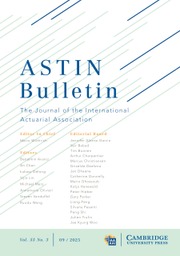No CrossRef data available.
Article contents
Random processes and their application to demography and insurance1
Published online by Cambridge University Press: 29 August 2014
Extract
Mr. Chairman, Honourable Colleagues!
Let me thank the organisers of this symposium for the honour they have done me by inviting me to present my report before this eminent audience. I would also like to express my thanks to all who are present here for the confidence shown to me as rapporteur.
The genesis and development of the theory of random processes is closely related to the problems of demography and insurance. Numerous problems stimulating the development of the theory of probability and the theory of random processes—the latter constituting one of the essential parts of the modern theory of probability—are connected with these two fields of research and activity.
The theory of random processes, being stimulated—similarly to other fields of mathematics—by concrete practical tasks, has created the general ideas and methods of research, achieving many valuable results. With the passage of time, it appeared that the theory of random processes can be usefully applied, by its conceptions, results and methods, to a number of scientific fields and practical activity. Its conceptions have found wide and important application to the earlier crystallized fields of human knowledge, as well as to the newly appearing ones.
These new fields of mathematics serve us as an example which once more corroborate the thesis, well known to us, according to which the course of the development of human knowledge starts from empirical observations, then passes up to abstract thinking and finally to practice.
- Type
- Research Article
- Information
- Copyright
- Copyright © International Actuarial Association 1971
Footnotes
Invited lecture to open the 8th Astin Colloquium held at Sopot, Poland, 22-24 September, 1969.
References
1 Invited lecture to open the 8th Astin Colloquium held at Sopot, Poland, 22-24 September, 1969.


